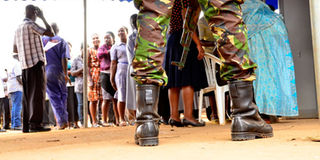Pomp, tight security await Pope

Pilgrims flock to Uganda Martyrs Shrine, Namugongo, amid tight security by police and UPDF. Photo by Dominic Bukenya
What you need to know:
Security. Kampala has been placed under tight security ahead of the Pope’s three-day visit
KAMPALA.
Kampala has been placed under security lockdown and police announced the city’s major roads would be closed ahead of Pope Francis’s visit today.
The Pontiff had a first stop-over in Kenya mid this week as he began a six-day, three-nation maiden pastoral visit to Africa since his 2013 election. The Central African Republic, to which Francis flies on Sunday, is the only other country on his itinerary.
Organisers expect between 1.5 to 2 million faithful at the Holy Father’s scheduled Saturday open-air Mass at Uganda Martyrs Shrine, Namugongo, 15kms outside Kampala. It is unlikely the venue, revamped at billions of shillings, can accommodate such a population.
An advance team comprising the Pope’s Swiss Guards and Vatican officials, who have made four evaluation trips to Uganda since August, cleared the security arrangements at the site and in the country.
Uganda’s foreign partners and allies, particularly the United States and Britain, are understood to be providing intelligence to ensure the Holy Father’s visit goes without incident amid world-wide threats of terrorist attacks.
Mr Chris Brown, the public affairs officer at the US embassy in Kampala, said: “As a matter of policy, we do not talk about Intelligence and security matters.” When the Pope lands at Entebbe, Uganda’s only international airport at 4:50pm today, he will find the first evidence of a nation palpable with joy and pride about his visit.
About 1, 000 animated men and women, most dressed in colourful traditional or African attire, will sing and dance on the tarmac as he disembarks from the Alitalia.
At hand to receive the 78-year-old pontiff will be President Museveni, and the two, according to official programme, will have a brief conversation at the airport’s presidential lounge before proceeding to the nearby resplendent State House.
His entourage will include thirty Vatican officials and some 70 international journalists who will be joined at State House by a battery of Ugandan colleagues.
The Uganda Catholic Martyrs shrine honours now 24 Catholic converts killed in the late 19th Century for defying a traditional king’s orders for them to abandon Christianity.
The apostolic voyage is, according to the Catholic leadership in Uganda, to belatedly commemorate the golden jubilee anniversary of the 1964 canonisation of the Uganda Martyrs.
Officials told a press conference in Kampala on Wednesday, November 25, that the shrine would be opened to the public twenty hours before the Saturday 9:30am papal mass.
Thousands of foreign guests are descending on the Ugandan capital, bringing in foreign exchange as they snap up hotel rooms for accommodation and spend on local travel, when they visit the country’s national parks and other tourist sites.
In Uganda, Pope Francis’s packed schedule includes a one-on-one meeting with President Yoweri Museveni, in power since 1986; speech to diplomats; an audience with catechists, teachers and selected couples; an address to 10, 000 youth; and, a visit to a home for disabled persons and the elderly before engaging with priests and bishops.
Although the pontiff has advocates care for nature and mercy for the poor, Ugandan authorities razed shacks along his mapped routes to seclude fabricators, carpenters and the underprivileged from sight.
“All our kiosks have been demolished. They have even chased us from where we [used to do business] as if the Pope is coming for the rich,” said Mr Moses Isabirye, a mechanic near the martyrs shrine.
In place of the makeshifts, from which struggling vendors eked a living by selling groceries, officials concerned about security and aesthetics have planted grass and flower beds on the widened road reserves.
His message will focus on hope, peace, love, reconciliation, peaceful elections, forgiveness as well as care for the underprivileged, the Uganda Episcopal Conference and the Vatican said in separate statements.
With fourteen million out of the 35 million Ugandans Catholics, Francis will find a church, like in other developing countries, that is growing but not at the same pace as its population or expanding secularity among particularly the young.
Officials hope his evangelisation and outreach to fringe and vulnerable populations will give fresh momentum to grow a following among Uganda’s predominantly youthful demographics.
In keeping with the Pope’s wish of non-profligate ceremonies, Uganda’s General Duties Minister in the Office of the Prime Minister, Prof. Tarsis Kabwegyere, said the government had acquired a cheap, small car to chauffeur the Holy Father.
Besides spiritual renewal, the pontiff’s visit has provided some sprinkling of dividends. Dirt roads in previously ignored city suburbs have been upgraded to bitumen, street lights fixed and law and order enhanced. Many of the works in the pope’s name have been done in haste, raising questions about their quality.
Police warned of possible widespread travel disruptions in and around the city since many roads, including the highway to the country’s only international airport, will be a no-go for motorists, raising the specter for individuals flying into or out of the country.




